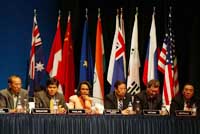ASEAN discusses security issues with neighbors China, South Korea and Japan
Asian foreign ministers on Tuesday endorsed North Korea's commitment to shut down its nuclear weapons program and praised moves toward setting up an East Asian trade bloc to help the region compete with groups like the European Union.

But their optimism was tempered by reports that a second South Korean hostage had been killed in Afghanistan. After holding a moment of silent prayer, they urged the Taliban to free their other 21 captives.
North Korea's shutdown of its Yongbyon nuclear reactor has eased tensions across Asia. But ministers from the Association of Southeast Asian Nations and powerhouses China, Japan and South Korea were clearly focused on ensuring that the progress continues to end the threat posed by a rogue regime's possession of atomic bombs - and the possibility that they could end up in terrorists' hands or spark a regional arms race.
They want to ensure that North Korea doesn't backslide in its commitments - made during six-nation talks that also involved the United States, South Korea, China, Japan and Russia - to dismantle its nuclear weapons programs in exchange for aid and other concessions. North Korea, well-versed in brinksmanship, has frequently broken such agreements after using them as a starting point for further talks.
In a joint statement, the ministers "stressed that the denuclearization of the Korean peninsula is essential in maintaining peace and security in the region, and expressed support for the resolution of the nuclear issue through dialogue and negotiation."
Japan said its priorities at the meeting were on North Korea and peace-building efforts in Southeast Asia, particularly in troubled East Timor and the Philippines' restive southern Mindanao region. Japan wanted the ministers' final statement to mention past abductions of its citizens by North Korea, while South Korea - apparently trying to avoid upsetting the North at a sensitive time - said the issue shouldn't be mentioned.
It wasn't in the statement, and neither were concerns about alleged human rights violations in the North, just a vague reference to the importance for the North to address "the issue of humanitarian and people concerns of the international community."
The talks also focused on creation of an East Asian economic community - first suggested by former Malaysian Prime Minister Mahathir Mohamad - and increased cooperation in dealing with disasters, alleviating poverty and combating outbreaks of diseases. South Korea suggested establishing a center for nurturing gifted science students that it would host.
Chinese Foreign Minister Yang Jiechi called for greater efforts to improve the region's economy and internal unity.
"Economic development in our region is still unbalanced and some countries still lag behind in economic and social development," he said. "The overall competitiveness of East Asia needs to be enhanced."
Yang did not mention any countries specifically, but even as economic growth has surged in Vietnam, Singapore and China, nations like Laos, Myanmar and Cambodia are badly lagging behind, partially because of social and political problems.
Myanmar is likely to be happy to have attention shift away after facing strong pressure from its neighbors to free Nobel Peace Prize laureate Aung San Suu Kyi and speed up democratic reforms amid increasing frustration with its military junta.
ASEAN agreed Monday to set up a regional human rights commission despite fierce resistance from Myanmar, whose rights record has been a constant problem for the regional group.
ASEAN has repeatedly said it hopes to encourage democratic reforms through "constructive engagement" with the junta, but it has made little tangible progress, tarnishing the group's reputation.
ASEAN consists of Brunei, Cambodia, Indonesia, Laos, Malaysia, Myanmar, the Philippines, Singapore, Thailand and Vietnam.
Subscribe to Pravda.Ru Telegram channel, Facebook, RSS!




